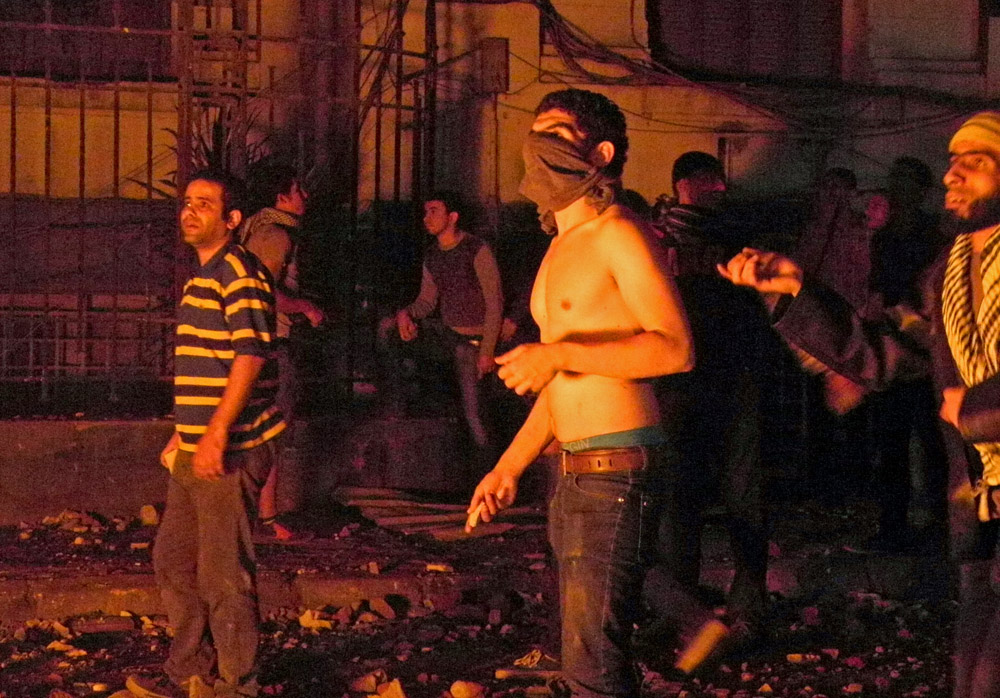
As Egypt’s President Mohammed Morsi and Prime Minister Hisham Qandil among others struggle to negotiate a cease-fire with the relevant interlocutors in the Gaza crisis, the anniversary of the Mohammed Mahmoud street clashes remind Egyptian revolutionaries how far they’ve come… and how very far they still need to go. Today, the echoes of fallen protesters in 2011 fuel the demands that remain unmet by Morsi’s government, which would be wise to take heed of calls for human dignity that ring as loud today as they did one year ago.
Fifty political and revolutionary groups took to the street once again to demand security sector reform, accountability, and justice for the 45 civilian victims of extreme police brutality and hundreds blinded or wounded at the hands of the Egyptian military and Central Security Force in November 2011. At that time, with the Supreme Council of the Armed Forces (SCAF) at the helm of the transition, questions lingered regarding whether Egypt would truly see a democratic transition. The question still emerges in the political landscape in Egypt, but the election of President Morsi and his dramatic decree that returned the military to its prior status removed from the role as “steward of the transition,” brought an element of hope to a turbulent process.
Nonetheless, worries over Muslim Brotherhood majoritarianism and bureaucratic domination lead to fears that Egypt may only have exchanged one pharaoh for another. Remembering the anger expressed in Tahrir square towards the SCAF by a large Islamist-dominated demonstration for attempting to hijack the constitutional process in the prelude to the Mohammed Mahmoud street battle, it appears now that the abused has become the abuser with the Brotherhood-driven constitutional process leading to secular and Christian defections. With reports of tear gas being used on protesters today, I am reminded of the chemical pepper smell that never quite leaves your senses. It’s as if Egypt remains stuck at the starting line of a long journey, its political actors still arguing over the right direction before it takes a step.
The grindingly slow reconstitution (no pun intended) of the fundamental elements of the Egyptian state in the post-revolutionary period has largely neglected calls for retribution for the victims of the violent clashes with the police remains. Human Rights Watch released a statement detailing the lack of accountability and continued impunity for the security officers implicated in the deaths of protesters. Ironically, though unsurprisingly, the casualties that resulted from the Mohammed Mahmoud street battles began as police used extreme methods to clear Tahrir Square of the Families of the Martyrs who protested – and continue to protest – the lack of accountability for the deaths of their relatives during the January 25th uprising.
Both President Morsi and the Egyptian judiciary, another political heavyweight in the transition, share much of the blame for promoting the climate of impunity. To date, the new Egyptian government has offered no real effort to either reform the Interior Ministry or conduct meaningful investigations into police misconduct. Karim Ennarah, a researcher in the general justice unit at the Egyptian Initiative for Personal Rights (EIPR), said that the recent reshuffle of the Interior Ministry indicated more an example of an independent and internal system of reward and punishment than an attempt to change its methods or practice. To be fair, new draft laws have surfaced that increase the penalties on police officers found guilty of torture, but no police (or military) officer has been found guilty of such a crime since the uprising.
More recently, the Egyptian military raided the homes of residents in Qursiyya, claiming the land they lived on belonged to the state and no claims to it were ever recognized by the government despite a 2010 court ruling that allowed residents to remain. Abdel-Rahman Hussein, an Egyptian journalist, noted how the military, an institution ostensibly meant to protect the country’s citizens, could only attack ordinary Egyptian civilians as if they were foreign invaders if they feared no retribution. This incident – and undoubtedly there will be more to come – is the price of a “half-revolution” whereby political interests have hijacked the revolutionary demand for true reform and human dignity.
As tear gas rains down on the protesters of Mohammed Mahmoud today, the Morsi government would do well to remember that attempts at reconciliation – such as issuing pardons for those accused of violence during the uprising (which may also apply to police and military) – can only work if reforms are implemented to prevent the recurrence of state violence against peaceful protesters. And even then, there is a chance it won’t work. For the families of the Martyrs, there can be no peace without justice. The same might be said for president Morsi and the fate of the revolution.
Tarek Radwan is the Associate Director for Research at the Atlantic Council’s Rafik Hariri Center.
Photo Credit: Laurence Underhill/DNE
Image: mohamed%20mahmoud.jpg
